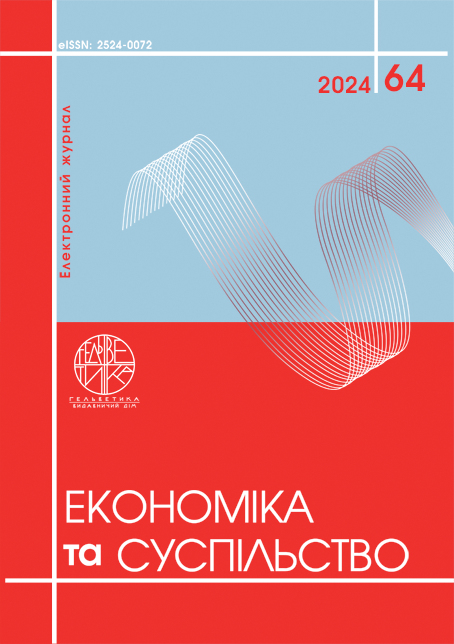ЕВОЛЮЦІЯ МІЖНАРОДНИХ ЗУСИЛЬ У ФОРМУВАННІ КЛІМАТИЧНОГО ВЕКТОРУ СВІТОВОЇ ЕКОНОМІКИ
Анотація
Стаття аналізує ретроспективу здійснення міжнародних зусиль та її еволюційну динаміку у сфері формування сучасної парадигми кліматично-нейтральної економіки. Аналіз охоплює ключові події та угоди за останні 50 років, відтворюючи особливості розвитку теми з моменту проведення Стокгольмської конференції ООН, Саміту в Ріо, Кіотського протоколу, Паризької та Зеленої угод, кліматичних пактів COP та інших. Стаття відслідковує ланцюгову та базисну динаміку викидів на тлі імплементації ключових міжнародних ініціатив, як результуючого показника ефективності в умовах розвитку кліматично-нейтральної економіки. У цьому контексті показано недостатній рівень консолідації міжнародних зусиль у напрямку скорочення вуглецевого сліду світової економіки, що обумовлює необхідність впровадження більш жорстких механізмів за глобальному рівні. Водночас, на прикладі еволюції регулятивної частини міжнародних угод показано, що досягнення «чистих» викидів на світовому рівні потребує додаткової підтримки в країнах, які розвиваються. Дослідження акцентує увагу на важливій ролі кліматичного лідерства в реалізації міжнародних зелених програм на прикладі ЄС.
Посилання
Andre et al. (2024). Globally representative evidence on the actual and perceived support for climate action. – processed by Our World in Data. “Government action on climate” [dataset]. Andre et al. (2024). Globally representative evidence on the actual and perceived support for climate action., “public_support_climate_andre” [original data]. https://www.nature.com/articles/s41558-024-01925-3
Meckling, J., & Allan, B. (2020). The evolution of ideas in global climate policy. Nature Climate Change, 10, 434-438. https://doi.org/10.1038/s41558-020-0739-7.
Pasimeni, F., Fiorini, A., & Georgakaki, A. (2021). International landscape of the inventive activity on climate change mitigation technologies. A patent analysis. Energy Strategy Reviews. https://doi.org/10.1016/J.ESR.2021.100677.
Štreimikienė, D., Mikalauskienė, A., & Macijauskaitė-Daunaravičienė, U. (2022). Role of information management in implementing the Green Deal in the EU and the US. Journal of international studies, 15(4), 9-27.
Wróbel, I. (2024). The ‘green’agreement between the European Union and Japan. Stosunki Międzynarodowe–International Relations, 2, 24.
Iozzelli, L. (2018). Rethinking Authority in Global Climate Governance: How Transnational Climate Initiatives Relate to the International Climate Regime. Global Environmental Politics, 18, 158-160. https://doi.org/10.1162/glep_r_00462.
Zhou, L., Zhou, C., Che, L., & Wang, B. (2020). Spatio-temporal evolution and influencing factors of urban green development efficiency in China. Journal of Geographical Sciences, 30, 724 - 742. https://doi.org/10.1007/s11442-020-1752-5.
McLaren, D., & Markusson, N. (2020). The co-evolution of technological promises, modelling, policies and climate change targets. Nature Climate Change, 10, 392-397. https://doi.org/10.1038/s41558-020-0740-1.
Crippa M., Guizzardi D., Pagani F., Banja M., Muntean M., … & Vignati, E. (2023) GHG emissions of all world countries – JRC/IEA 2023 Report, EUR xxxx EN, Publications Office of the European Union, Luxembourg.
Jarvie M. (2022) "Brundtland Report". Britannica. URL: https://www.britannica.com/topic/Brundtland-Report. (Accessed 26 July 2024)
Cadman, T. (2018). The United Nations Framework Convention on Climate Change. The Palgrave Handbook of Contemporary International Political Economy. https://doi.org/10.1057/978-1-137-45443-0_23.
Pata, U. K., & Ertugrul, H. M. (2023). Do the Kyoto Protocol, geopolitical risks, human capital and natural resources affect the sustainability limit? A new environmental approach based on the LCC hypothesis. Resources Policy, 81, 103352.
Kinley, R., Cutajar, M., Boer, Y., & Figueres, C. (2020). Beyond good intentions, to urgent action: Former UNFCCC leaders take stock of thirty years of international climate change negotiations. Climate Policy, 21, 593 - 603. https://doi.org/10.1080/14693062.2020.1860567.
Asadnabizadeh, M., & Moe, E. (2024). A Review of Global Carbon Markets from Kyoto to Paris and beyond: The persistent failure of implementation. Frontiers in Environmental Science, 12, 1368105.
European Commission. (2019). Communication from the Commission to the European Parliament, the European Council, the Council, the European Economic and Social Committee and the Committee of the Regions: The European Green Deal (COM/2019/640 final). EUR-Lex. URL: https://eur-lex.europa.eu/legal-content/EN/TXT/?uri=CELEX:52019DC0640
Neuhoff, K., Chiappinelli, O., Kröger, M., Lettow, F., Richstein, J., Schütze, F., Stede, J., & Xi, S. (2021). Green Deal for industry: A clear policy framework is more important than funding. , 11, 73-82. https://doi.org/10.18723/DIW_DWR:2021-10-1.
Barron, P., Cord, L., Cuesta, J., Espinoza, S., & Woolcock, M. (2023). Social sustainability in development: Meeting the challenges of the 21st century. World Bank Publications.

Ця робота ліцензується відповідно до Creative Commons Attribution 4.0 International License.


